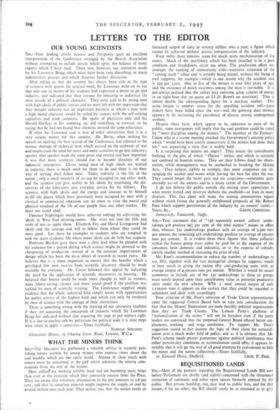' WHAT THE MINERS THINK
Slit,—The Spectator his performed a valuable service in recently pub- lishing letters written by young miners who express views about the coal muddle which are too rarely heard. Anyone in close- touch with miners must be concerned at the gulf which separates the mining com- munities from the rest of the nation.
Most collier?' are working terribly hard and are becoming more bitter than ever at the criticism which they constantly receive from the Press. They are aware that voluntary absenteeism in the.pits amounts to 5.8 per cent., and that its complete removal might improve the supply of coal by several million tons each year. They realise, too, that the nation needs an increased output of sixty or seventy million tons a year, a figure which cannot be achieved without drastic reorganisation of the industry.
Even today there remains room for much more mechanisation of the mines. Much of the machinery which has been installed is in a poor condition and breakdowns occur too often. The production effort en- courages the running of unnecessary risks—excessive extension of the " cutting track " when coal is actually being mined, without the fixing of roof supports, for example—which is one reason why the accident rate is 229 per 1,000. One in five of the miners is over fifty years of age, and the existence of much weariness among the men is inevitable. It is not always realised that the .collier may consume 4,6op calories of energy in an eight-hour day (to quote an I.L.O. Report on nutrition). This is almost double the corresponding figure for a machine worker. This acute fatigue is another cause for the appalling accident toll-5,00o miners have been killed since the war—and the growing dust menace appears to be increasing the prevalence of disease among underground workers.
Despite these facts, which appear to be unknown to most of the public, some newspapers still imply that the coal problem could be cured by " more discipline among the miners." The member of the Farmers' Union who at a recent meeting attacked the Government's outcrop policy which " would have been utterly unnecessary if the miners had done their job," was expressing a view that is widely held.
Is it surprising that miners are angry? They resent the considerable bullying in the pits, of which " Oncost " writes, and which is certainly not confined to Scottish mines. TEey see their fellows fined for absen- teeism, while managements may be unchecked in breaking the Mining Acts. They belieye, rightly or wrongly, that some companies are de- veloping the weaker coal seams while leaving the best for after the war. They cannot forget the bitter past and are suspicious—sometimes quite absurdly so—of the owners and to a lesser extent of the Government.
I do not believe the public outside the mining areas appreciates to what extent hatred and mistrust darkens the coalfields—at least in many districts. This fact alone will make the mining communities regard without much favour the generally enlightened proposals of Mr. Robert Foot which support government of the industry by an owners' cartel.—


























 Previous page
Previous page